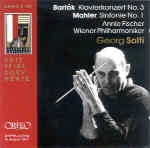Fans of Annie Fischer will want this disc for her elegant interpretation of Bartók’s Third Concerto. Despite the wooden tone of her piano, and the fact that the orchestra sounds rhythmically challenged and seems (strings especially) very unfamiliar with the work, Fischer has an effortless manner of phrasing that’s quite compelling. Her inward (but not too slow) take on the central Adagio religioso also is very moving.
Both the Bartók and the Mahler come from the same August, 1964 Salzburg Festival concert, which is about the same time that Georg Solti recorded the symphony with the LSO for Decca. As with that terrific studio version, his view of the work is direct, fresh, and extremely exciting, with perhaps a bit more spontaneity and freedom of tempo in this live performance. He also has the Vienna Philharmonic playing like demons in the finale, and despite a few expected slips (timpani get lost for a minute, woodwinds miss the occasional entrance, some brass flubs) the execution really is surprisingly good–positively thrilling in the closing pages. The mono sound is extremely naturally balanced, clear, and listenable. Very enjoyable.
































